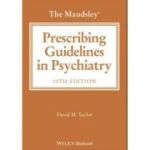Forensic Psychiatry Clinical, Legal and Ethical Issues

Preț: 840,00 lei
Disponibilitate: în stoc la furnizor
Autor: John Gunn, Pamela Taylor
ISBN: 978-0-340-80628-9
Editura: Routledge
Anul publicarii: 2014
Ediția: 2
Pagini: 1035
Categoria: PSYCHIATRY
DESCRIERE
Comprehensive and erudite, Forensic Psychiatry: Clinical, Legal and Ethical Issues, Second Edition is a practical guide to the psychiatry of offenders, victims, and survivors of crime. This landmark publication has been completely updated but retains all the features that made the first edition such a well-established text. It integrates the clinical, legal, and ethical aspects of forensic psychiatry with contributions from internationally regarded experts from a range of clinical professions. The Second Edition features updates to all current chapters and several new chapters that explore: The genetics of antisocial behavior Disorders of brain structure and function that relate to crime Offenders with intellectual disabilities Older people and the criminal justice system Deviant and mentally ill staff Although the book focuses on jurisdictions in the UK, a substantial comparative chapter written by an international group from all five continents explores the different philosophies, legal principles, and style of services elsewhere. This book is an essential reference for specialists and postgraduate trainees in forensic psychiatry but also for general psychiatrists, and clinical and forensic psychologists. It is also an invaluable resource for other forensic mental health professionals, including nurses, social workers, occupational therapists, probation service staff, police, attorneys, criminologists, and sociologists. Introduction Forensic psychiatry A victim-centred approach Context Medical language Achieving the knowledge and skills Further enquiry Criminal and civil law for the psychiatrist in England and Wales Common law and civil or Roman law European courts Court structure, England and Wales Criminal law in England and Wales Agencies of the law Civil law The Coroner’s court Mental health and capacity laws including their administering bodies Preamble Human rights legislation Historical background Mental capacity Mental Health Act 1983 amended by the Mental Health Act 2007 Mental Capacity Act 2005 (MCA) Legal arrangements in the rest of the British Isles and Islands Preamble Scotland Northern Ireland Military law in the United Kingdom Isle of Man Channel Islands Republic of Ireland Concluding comments Forensic psychiatry and its interfaces outside the UK and Ireland The scope and limits of the comparative approach The scope and limits of this chapter National, subnational and supranational legal structures Controversial issues and shifts in public and professional opinions Forensic mental health (FMH) services and interventions under criminal and civil law: Germany and the USA Forensic psychiatric services and interventions under criminal and civil law: The Nine Nations (SWANZDSAJCS) Study Specialist recognition in Europe and SWANZDSAJCS countries Research in forensic psychiatry, psychology and allied professions Illustrative cases Conclusions Further reading Psychiatric reports for legal purposes in England and Wales The forum of the court: Background issues Constructing a report The use of reports in criminal proceedings Civil matters Examples of other documents which may be consulted The psychosocial milieu of the offender Introduction Measurement and epidemiology The natural history of offending Factors associated with delinquency and offending Explaining the development of offending Implications for prevention Conclusions Genetic influences on antisocial behaviour, problem substance use and schizophrenia: evidence from quantitative genetic and molecular genetic studies Introduction Basic genetics Genetic study methods The genetics of antisocial behaviour, problem substance use and schizophrenia Conclusions Violence Theoretical background Violence as a health issue Crimes of violence Disordered and offensive sexual behaviour Sex offending, sexual deviance and paraphilia Sex offending by females and adolescents Psychiatric questions Risk assessment Sex offender treatment Treatment or control The majority of crime: theft, motoring and criminal damage (including arson) Introduction Recording of crime Acquisitive offending Criminal damage Arson Motoring offences Overview Disorders of brain structure and function and crime Expectations and advances: Conceptualization and measurement of brain structure Epilepsy in relation to offending Sleep disorders Amnesia and offending Brain imaging studies as a route to understanding violent and criminal behaviour Serotonergic function in aggressive and impulsive behaviour: Research findings and treatment implications Implications of current knowledge of brain structure and function for forensic mental health practice and research Offenders with intellectual disabilities Clinical and legislative definitions People with intellectual disability detained in secure health service facilities in the UK Crime and people with intellectual disabilities Theories of offending applied to people with intellectual disabilities Offenders with intellectual disabilities and additional diagnoses Genetic disorders, intellectual disability and offending: Genotypes and behavioural phenotypes Alcohol and substance misuse Care pathways for offenders with intellectual disabilities Assessment and treatment of anger and aggression Assessment and treatment of sexually aggressive behaviour among people with intellectual disability Fire-setting behaviour among people with intellectual disability Assessment and management of risk of offending and/or harm to others among offenders with intellectual disabilities Legal and ethical considerations in working with offenders with intellectual disabilities Conclusions Psychosis, violence and crime Vulnerable to violence and vulnerable to being violent Psychosis and crime: The epidemiology Pathways into violence through psychosis: Distinctive or common to most violent offenders? Psychosis, comorbid mental disorders and violence Clinical characteristics of psychosis associated with violence Environmental factors which may be relevant to violent outcomes among people with functional psychosis Management and treatment Conclusions Pathologies of passion and related antisocial behaviours Erotomanias and morbid infatuations Jealousy Stalking Persistent complainants and vexatious litigants Conclusions Personality disorders Concepts of personality disorder Personality disorder assessment tools How common are disorders of personality? Clinical assessment and engagement in practice Causes and explanations of personality disorders Treatment of personality disorder Dangerous and severe personality disorder (DSPD): The rise and fall of a concept Personality disorder: Some conclusions Deception, dissociation and malingering Deceptive mental mechanisms Pathological falsification Dissociative disorders Deception Addictions and dependencies: their association with offending Alcohol Other substance misuse Pathological gambling Juvenile offenders and adolescent psychiatry Juvenile delinquency UK comparisons Mental health Pathways of care and the juvenile justice system Government policy for England Special crimes Adolescent girls Conclusions Women as offenders Why a chapter on women? Women and crime Women, mental disorder and offending Services for women Conclusions Older people and the criminal justice system How many older offenders? What sort of crime? Associations between psychiatric disorder and offending in older age Older sex offenders Service and treatment implications Dangerousness Introduction Theoretical issues Risk assessment and structured judgment tools Threat assessment and management Communicating about risk Risk assessment and management: Bringing it all together Conclusions Principles of treatment for the mentally disordered offender Creating a therapeutic environment within a secure setting Occupational, speech and language, creative and arts therapies in secure settings Pharmacological treatments Physical healthcare Psychological treatments Attachment and psychodynamic psychotherapies Conclusions Forensic mental health services in the United Kingdom and Ireland Cycles in fear and stigmatization: A brief history of secure mental health services Specialist forensic mental health services: Philosophies and a theoretical model The nature of hospital security Specialist community services within an NHS framework Health service based forensic psychiatry service provision in Scotland Health service based forensic psychiatry service provision in Northern Ireland Health service based forensic psychiatry service provision in Ireland Offenders and alleged offenders with mental disorder in non-medical settings Working with the police People with mental disorder in prison Working with the Probation Service Working with voluntary agencies Service provision for offenders with mental disorder in Scotland Service provision for offenders with mental disorder in Northern Ireland Offenders and alleged offenders with mental disorder in non-medical settings in Ireland Ethics in forensic psychiatry Codes and principles Teaching and learning ethics Some contemporary questions Heuristic cases The death penalty Deviant and sick medical staff The medical power balance Boundaries and offences Abuse in institutions Sexual assault Clinicide and CASK Commentary Victims and survivors Learning from victims and survivors Voluntary and non-statutory bodies inspired by victims The growing centrality of victims of serious crime in the criminal justice system Reactions to trauma and forms of post-traumatic disorder Psychological understanding of post-traumatic stress disorder From victim to survivor: Help and treatment From victims to survivors: Conclusions Appendices Appendix 1: ECHR Appendix 2: MHA 1983 Appendix 3: Experts’ Protocol Appendix 4: Hippocratic Oath Cases cited References Index
Categorii de carte
-Comandă specială
-Edituri
-Promo
-Publicaţii Callisto
-Cărţi noi
-- 387,45 leiPRP: 430,50 lei
- 401,63 leiPRP: 446,25 lei
- 552,83 leiPRP: 614,25 lei
Promoţii
-- 384,30 leiPRP: 640,50 lei
- 183,75 leiPRP: 262,50 lei
- 84,00 leiPRP: 210,00 lei















REVIEW-URI